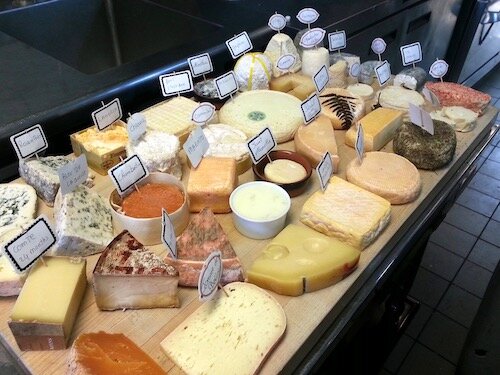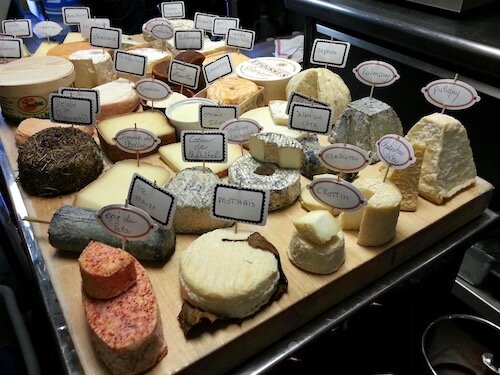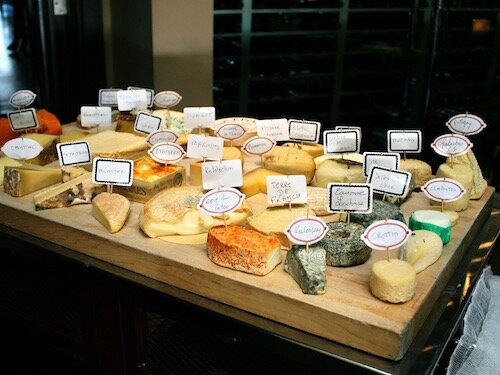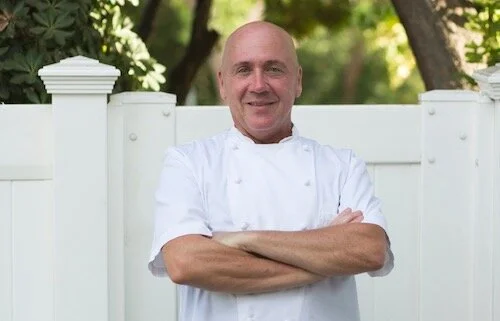Avant-garde French chef Laurent Quenioux hosted elaborate ticketed dinners in his Highland Park backyard in the Before Times and became known for his beyond-abundant French cheese carts with housemade condiments. During the pandemic, he delivered raw milk cheeses to customers spanning from Dana Point to the Pacific Palisades. As COVID-19’s fog lifted, Quenioux resumed pop-ups at his new home in Corona. Before dessert, he rolls out a seasonal cheese cart that’s almost certain to convince people to order too much cheese.

Seasonality of Cheeses from France
Quenioux is originally from Sologne in France’s Loire Valley and continues to work with a cheesemonger in France. He also uses top-secret methods to source prized cheeses that truly stand out in Los Angeles. Many cheeses he buys are made from raw cow’s milk, including Abbaye de Citeaux, Maroilles, and Galet D’Albatre. In spring, he also gets fresh goat’s milk cheese. “All cheeses in France are mostly season driven,” Quenioux says. “For example a cheese like Valencay is these days available all year long. However, it is best in March and April because of the milk and the spring grass the goats are grazing on. Vacherin season starts in November because cows graze the summer high-altitude grass and wild flowers.” Quenioux often trusts his cheesemonger’s suggestions.
Serving Cheese to Please

Serving cheese is involved and Quenioux takes affinage (refining) seriously at his house. “We separate all cheeses by milk and follow our expertise from our cheese monger about temperature, moisture and rotation,” he says. “We also limit inventory in order to run out rather than to keep them on shelves getting overripe. That is why we asked our clients to be patient by ordering them a week ahead in order for them to get the best quality with no compromise. We use a special refrigerator with wood planks that are maintained in a very sanitized way. No short cuts.” Sales are modest, and he’s okay with that. “You never make money with cheese,” Quenioux says. “You just want to do it. We want to offer something genuine.”
Quenioux’s Corona home features enough room to host a 150-person banquet and three distinct environments—a fruit orchard with cherry, apricot, peach and plum trees, a more casual setting near the vegetable garden and water fountain can seat 10 people, and a fire pit where up to 20 people can be seated. He also hosts bi-weekly pop-ups at an undisclosed location in Glassell Park and at Joanna Bassi’s Rose Hill Farm in Montecito Heights. “But if you want the true experience, you’ll have to come down here,” Quenioux says.

An Epic Cheese Cart
Quenioux’s cheese cart has become a big attraction, typically touting 30-40 choices. Before the pandemic, he actually had two cheese carts, one focusing on French cheeses, the other featuring U.S. cheeses. For COVID-19’s sake, he consolidated to a single cart. Quenioux personally explains each selection and even though most people are full by this point in the meal, they still order plenty of cheese. “They eat more with their eyes than their stomach,” he says. At LQ Foodings @ MaMaison dinners, 3 cheeses cost $15, 5 cheeses cost $24, and 7 cheeses cost $30. Every additional cheese is $5. “We’ve had people buy the whole thing,” Quenioux says. “It does happen more than you think.”
Raw Milk Cheese
For Quenioux, serving raw milk cheeses is “the only way.” He’s convinced that pasteurized cheese is “not the same,” citing texture and taste differences. When it comes to his preferred origin, he looks to his homeland. “I know more about French cheeses because it is my terroir,” Quenioux says. “I know the cheese, I know my birth country souls and traditions, I know where the cheese are made, and I know the players who are passionate about making those raw milk’s cheese.” That said, he respects U.S. cheese makers and will feature U.S. cheeses later this year, after he builds his knowledge and relationships.
Cheese Accompaniments
Accompaniments vary by season, but July’s selection included apricot jam made with homegrown fruit, blueberry jam, and strawberry balsamic jam. Apricot and blueberry jam will last the whole year. Fall brings onions in maple syrup, quince, apples, and pears. Winter welcomes preserved pumpkin purees.
For his July 2021 cheese cart, Quenioux also provided a pitcher of truffle honey featuring wildflower honey infused with house-made winter truffle oil. He also soured walnut and candied cranberry bread from a Pomona bakery, though he says, “To be honest, the better bread for cheese is a beautiful plain baguette.”
“The truffle honey, you can smear that everywhere,” Quenioux says. “It works with all the cheese. The blueberry jam, we suggest on hard cheese like Cantal, Comté, and Beaufort. The apricot will go on the ripe cheese, if you wanted Epoisses, Pont l’ Eveque or Camembert…In the apricot jam we add vanilla, so it really balances the pungent cheese. I would say strawberries with balsamic vinegar or the onions with maple or the quince, that’s goat cheese.” Of course, personal preferences transcend recommendations. “You can always try crisscross everything with the jam and having fun with your cheeses,” Quenioux says. “Some people just have different tastes.”
Depending on the season, and for occasional classes, Quenioux may also experiment with cheese flights on the cart. For example, he’ll offer Comté aged 12, 18, 24, and 30 months. “People are totally amazed by it on how different cheese can get during their appropriate ripening process,” Quenioux says.
He also applies that approach to goat cheese. “First they are fresh, then a few weeks later they are ripe at the heart, then a few later they are starting to pieule (French expression that means that they are sharp in the inside and runny on the outside; this is my favorite stage for those cheese),” he says. “So on the cart we may propose a fresh one, next to a ripe one, next to a pieule one.
“When I was a kid, my father used to take me, before I was 10, to three-star restaurants,” Quenioux recalls. “He used to say, ‘Son, you know if it’s a good restaurant when you check out the bathroom and the cheese cart.’”
He estimates 85% of diners venture to his pop-up from the Westside, downtown, or Pasadena. Drives could take two hours round-trip. “So we have to give them something,” Quenioux says. “We have to offer them an incredible experience.” Not making the trek to Corona? Whole or half wheels, or 5-ounce cheese can be ordered directly through Laurent Quenioux.

